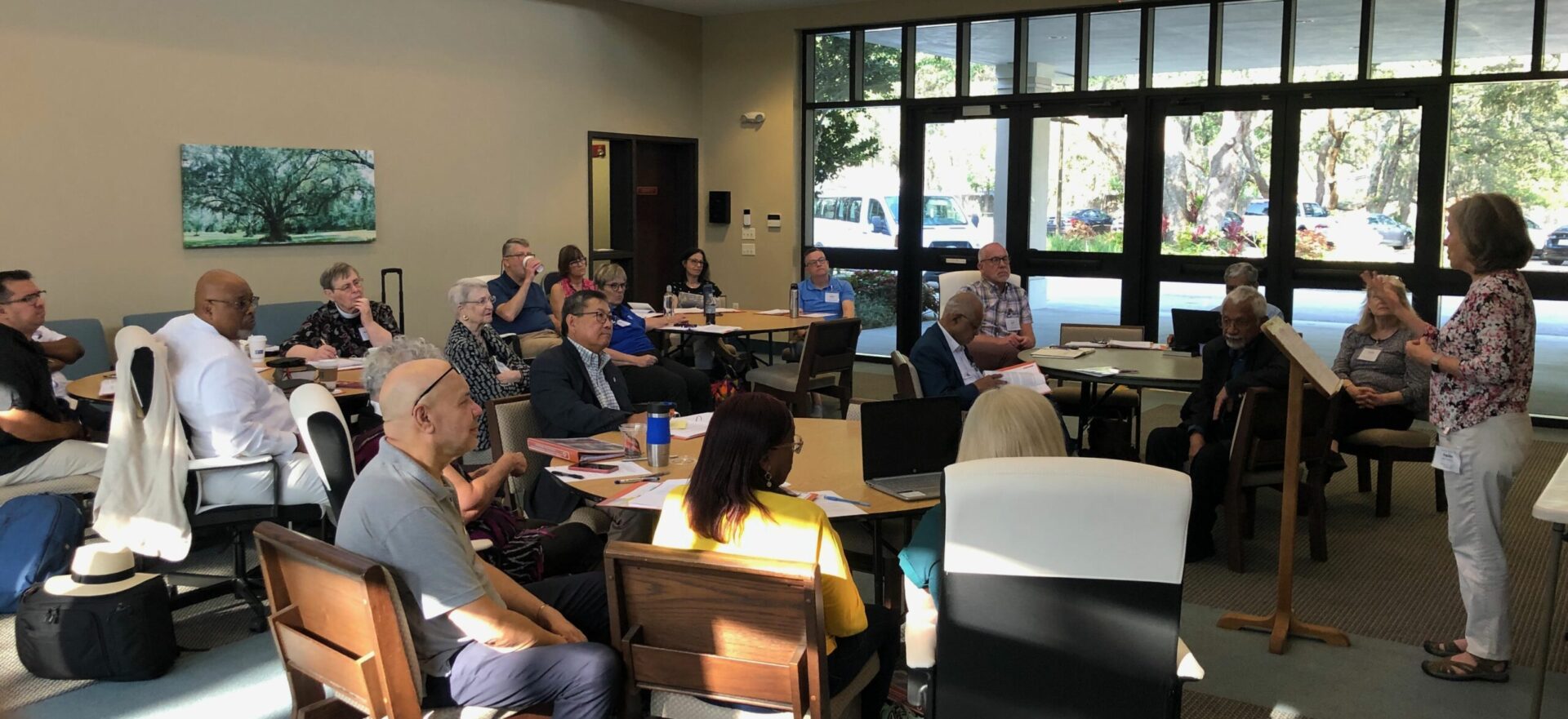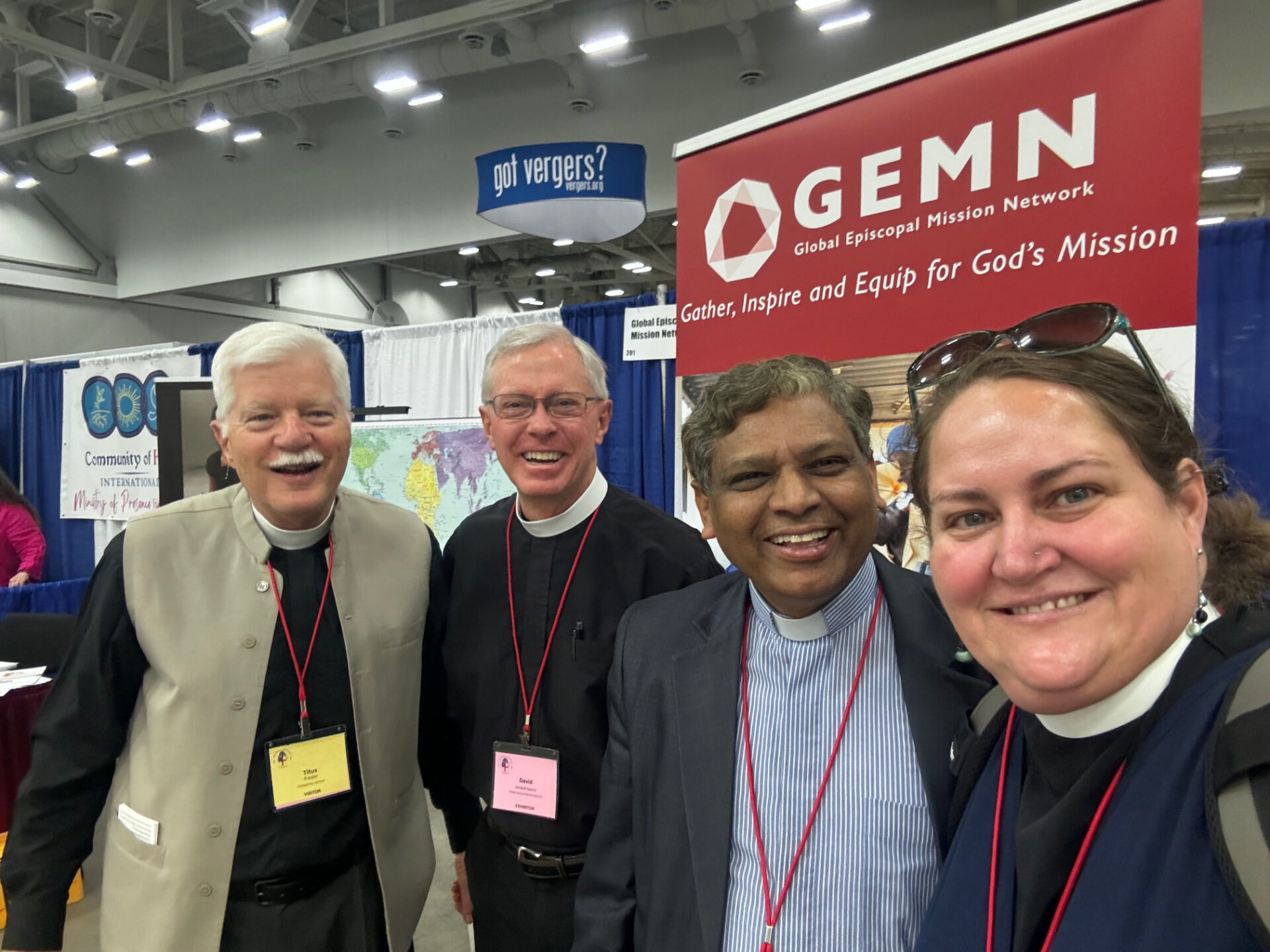As GEMN celebrates the 30th anniversary of its founding in 1995 and its incorporation in 1996, it’s good to review the history of Episcopal mission networking that has brought us to where we are in 2025 and 2026.
During much of the history of the Episcopal Church, most of the church’s global mission work was coordinated and carried out by the Domestic and Foreign Missionary Society (DFMS), established in 1835 as the church’s centralized structure for mission, both domestic and international.
work was coordinated and carried out by the Domestic and Foreign Missionary Society (DFMS), established in 1835 as the church’s centralized structure for mission, both domestic and international.
A major shift began in the late 1960s. In response to crises of poverty and racism in the United States, the Episcopal Church reallocated to domestic priorities much of the initiative and funding that had gone into international engagement through missionaries and other collaborations. In response to that reallocation, Episcopalians who were committed to cross-cultural mission founded a number of freestanding agencies that began to send missionaries and initiate global partnerships on their own.
The multiplication and diversity of global initiatives prompted the founding in 1990 of the Episcopal Council for Global Mission (ECGM), which included the new agencies such as the South American Missionary Society-USA (SAMS), Sharing of Ministries Abroad-USA, the Society for the Promotion of Christian Knowledge-USA, Our Little Roses and others; along with longstanding central agencies such as DFMS, Episcopal Relief and Development, and the United Thank Offering. Despite being called a council, the new network was purely consultative and had a horizontal, decentralized leadership structure. It succeeded in increasing mutual appreciation and cooperation among all participants and launched initiatives such as an annual conference, a consultation on underevangelized people groups, and a conference on persecuted Christians.
This growth of independent mission activity was so strong that, in preparation for the 1994 General Convention, Executive Council proposed that DFMS discontinue sending missionaries as a normative practice. The rationale was that the new organizations were committed to carrying out missionary-sending, and it was thought that DFMS need not duplicate that effort. The proposal was controversial, however, and ECGM mobilized to oppose the proposal because its members felt that sending missionaries was a core function of the church as a whole that should not be abandoned.
Meanwhile, another group of mission activists prepared a contingency plan in case the proposal was approved. They reasoned that if DFMS were to discontinue sending  missionaries, the next canonical level in the church, the dioceses, could continue that work. They formed the Global Episcopal Mission Network as a consortium of dioceses to step into that role, if needed. The dioceses of New York and Southern Ohio were the founding dioceses of the new network.
missionaries, the next canonical level in the church, the dioceses, could continue that work. They formed the Global Episcopal Mission Network as a consortium of dioceses to step into that role, if needed. The dioceses of New York and Southern Ohio were the founding dioceses of the new network.
As the drama unfolded, the 1994 General Convention rejected the proposal that DFMS discontinue sending missionaries, so DFMS has continued to send missionaries. Nevertheless, the founding activists of GEMN believed that the new network would still be useful in supporting the work of DFMS and promoting the cause of global mission throughout the church, so they continued to organize GEMN. Bylaws were drafted, the network came together in 1995, and GEMN was incorporated in 1996 as a non-profit 501c3 organization in the state of New York.
GEMN early began a pattern of holding an annual mission conference, now called Missio, at various venues around the country and sometimes outside the USA. A major initiative was the annual Mission Institute, which evolved into today’s Mission Formation Program.  The network was supported financially by diocesan membership dues. The network has always bee led by a 12-member elected Board of Directors, whose members serve three-year terms. During most of its history GEMN has had a part-time executive director.
The network was supported financially by diocesan membership dues. The network has always bee led by a 12-member elected Board of Directors, whose members serve three-year terms. During most of its history GEMN has had a part-time executive director.
Meawhile, in 2000 ECGM was reorganized as the Episcopal Partnership for Global Mission (EPGM) with an official relationship with Executive Council recognized by General Convention. Beginning in 2024, however, a number of it member agencies withdrew from EPGM over the church’s sexuality controversy, weakening its reason for existence as a network bridging differences within the church. When EPGM disbanded in 2010, GEMN became the church’s sole network for promoting world mission.
In the 2010s, membership in GEMN was expanded beyond dioceses to include congregations, seminaries, religious orders and individuals, a membership that reflects the fact that much of the Episcopal church’s global mission is now carried out by these diverse entities, as well as by the church’s centralized structures. Thus global mission has been decentralized, localized, diversified and democratized, a shift that the Episcopal Church shares with other denominations such as the Evangelical Lutheran Church in America, the United Methodist Church and the Presbyterian Church USA.
GEMN participates in major church gatherings. At General Convention  GEMN maintains a booth, participates in world mission hearings, hosts conversations with mission activists, and sponsors the World Mission Reception. GEMN is also represented at the annual conferences of the Episcopal Parish Network and Forma.
GEMN maintains a booth, participates in world mission hearings, hosts conversations with mission activists, and sponsors the World Mission Reception. GEMN is also represented at the annual conferences of the Episcopal Parish Network and Forma.
As in many other sectors of the church, the Covid pandemic prompted GEMN to work online as well as in person. The Board had already long been holding its monthly meetings on Zoom. While Missio was canceled in 2020 due to the pandemic, Missio in 2021, 2022 and 2024 was held online, and the Mission Formation Program has been offered online as well. In a specific new response to the pandemic, GEMN instituted Mission Thursdays, the monthly online mission networking venue where specific initiatives around the church are highlighted, and this was experienced as so beneficial that it continues to be part of GEMN’s outreach. Yet GEMN prioritizes in-person encounter in community, which is the norm for Missio.

As formulated by the GEMN Board in 2021, the purpose of GEMN is to “Gather, Inspire and Equip People to Participate in God’s Mission.” The network’s core values are Humility, Inclusion and Companionship.
GEMN creates a space for global mission activists to exchange ideas and best practices. It offers global mission education and provides resources to those who are exploring their call to engage in mission. GEMN itself does not initiate global mission work. Instead, it is a network of mission-activist organizations and individuals that seek to support one another in sharing experiences, resources and perspectives on the global mission of God.
GEMN’s major initiatives include:
- Missio, the annual Global Mission Conference, offers inspiring speakers, insights from experienced missioners, opportunities for networking, workshops, site visits, mission agency presentations, and other resources for the mission community.
- Mission Formation Program over a two-year sequence offers formation in biblical foundations, mission history and theology, intercultural dynamics, mission companionship, and practical team-building. It is also available to be held in dioceses and on a provincial basis.
- Mission Thursdays, offered monthly, highlight the initiatives of dioceses, agencies and religious orders, as well as discussions of developments arising from General Convention, the Lambeth Conference and relevant events in the wider world.
- Global Mission News, a monthly email newsletter, includes a wide range of global mission news developments and is circulated to all on the GEMN mailing list.
- Mission Resources on the GEMN website include the Global Mission Prayer Cycle, Global Mission News, missionary blogs, mission planning materials, bibliographies, financing strategies and more. Also included is the Global Mission Digital Toolkit, developed in collaboration with Office of Global Partnerships staff and the Standing Commission on World Mission.
- Global Mission Advocacy and Networking keep global mission at the forefront of the church’s dialogue in such forums as General Convention and Executive Council and connect those seeking a way to live out God’s call to mission engagement.
– Executive Director Titus Presler
